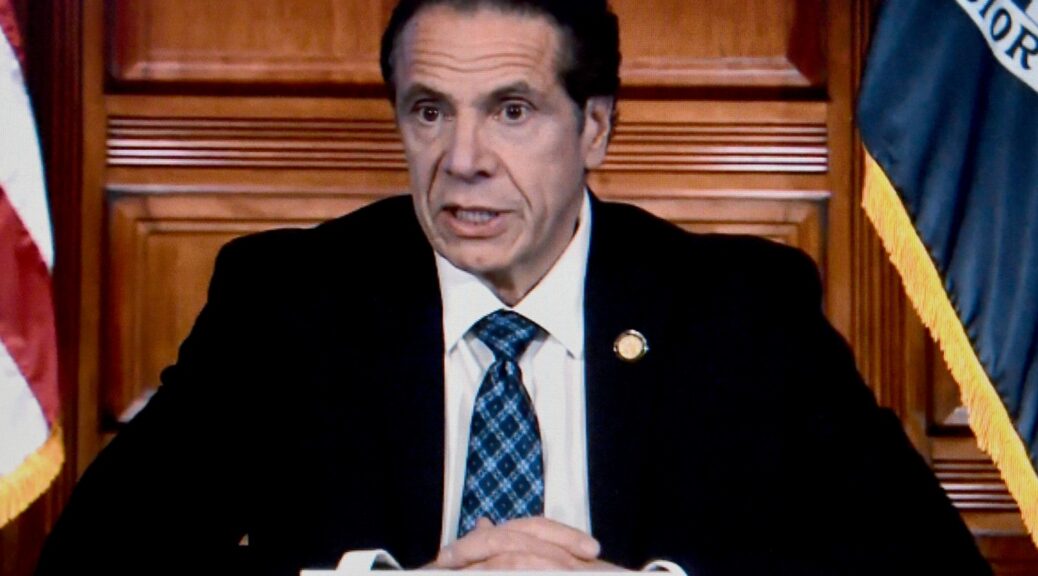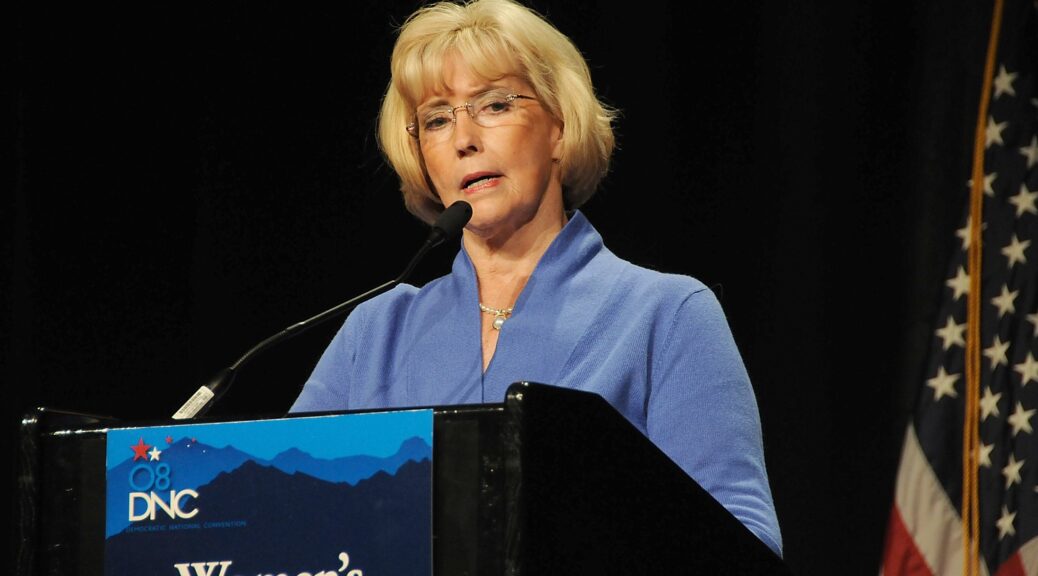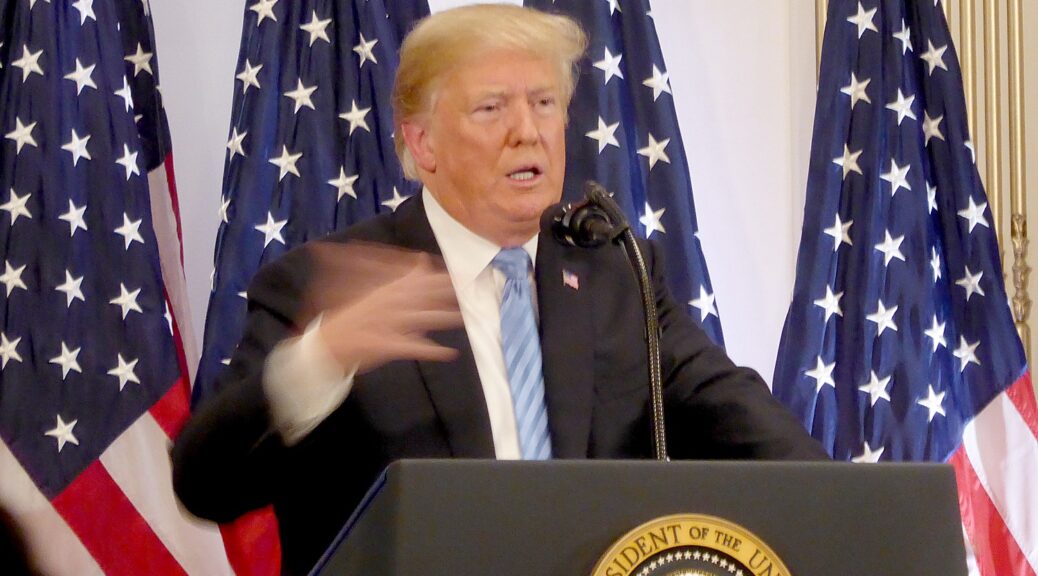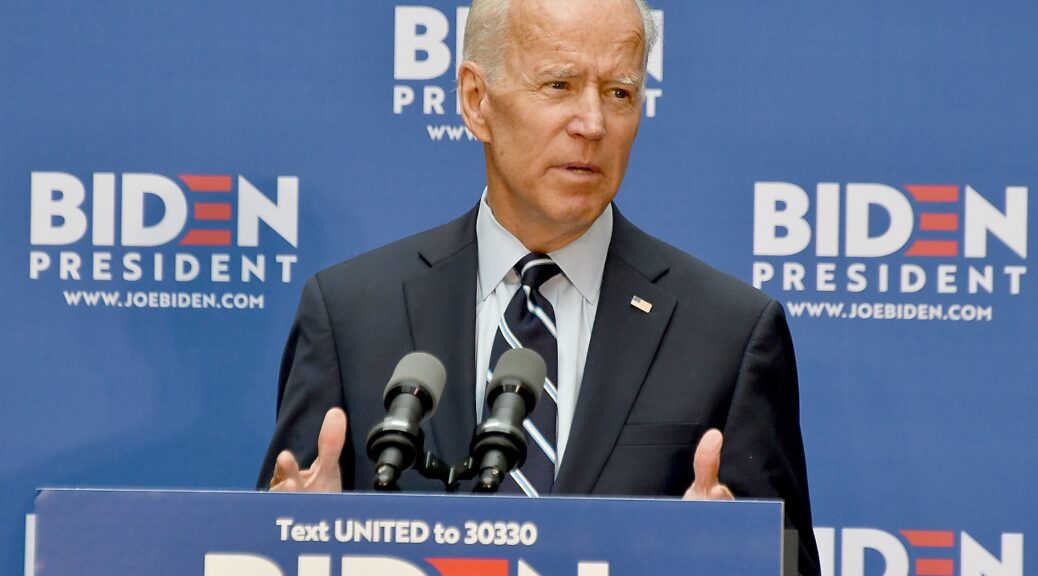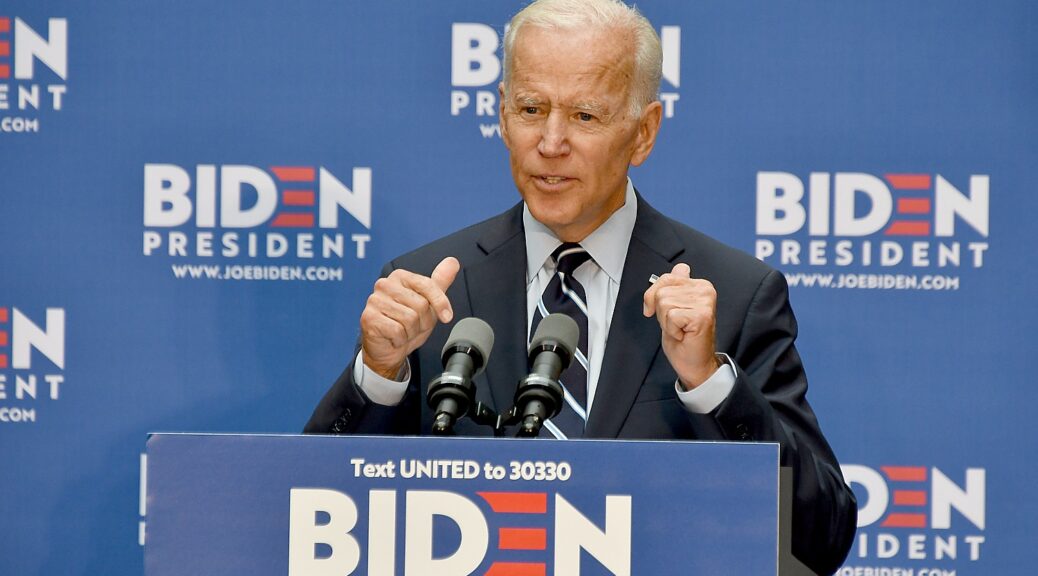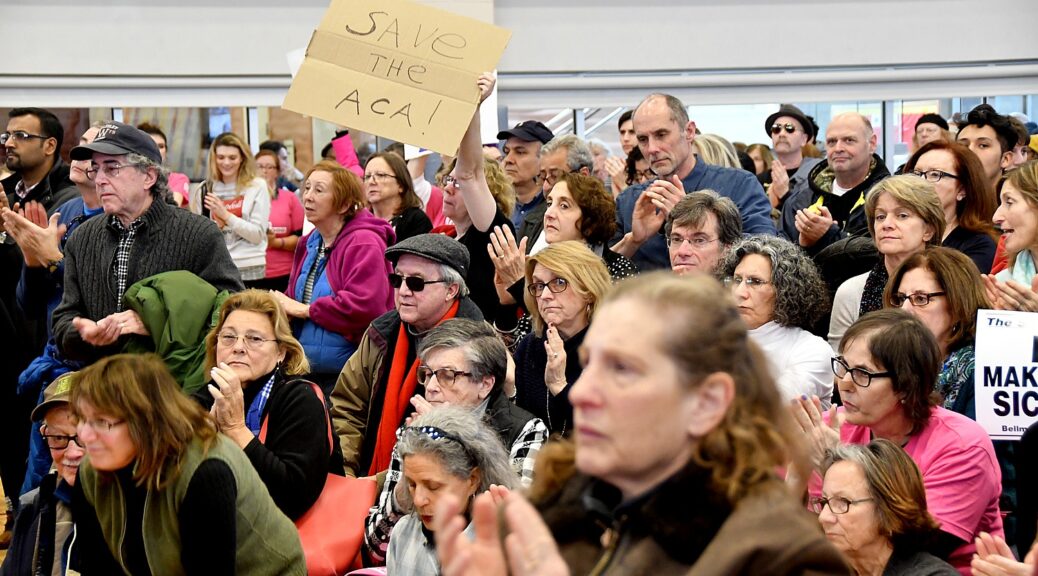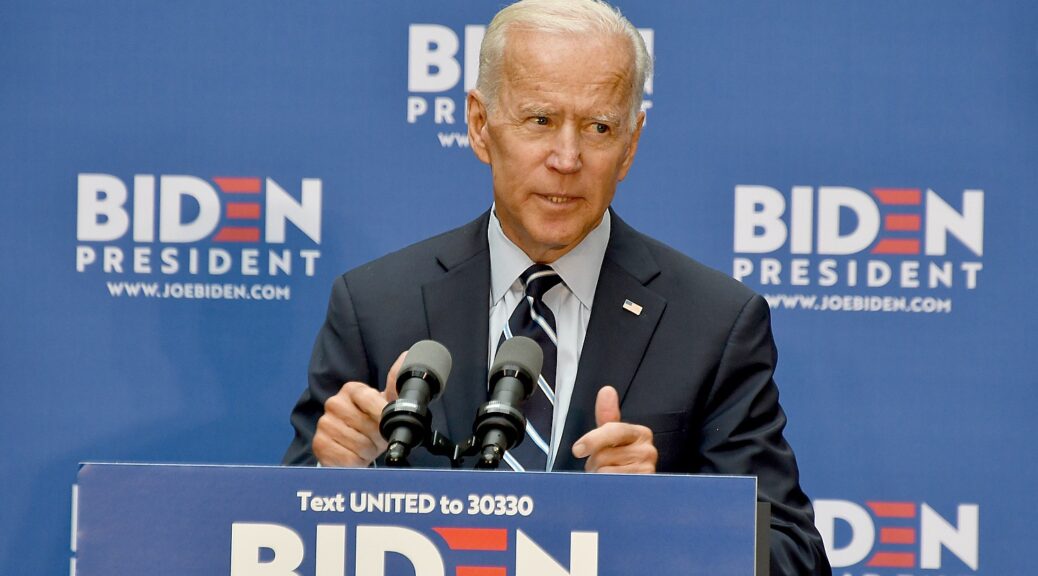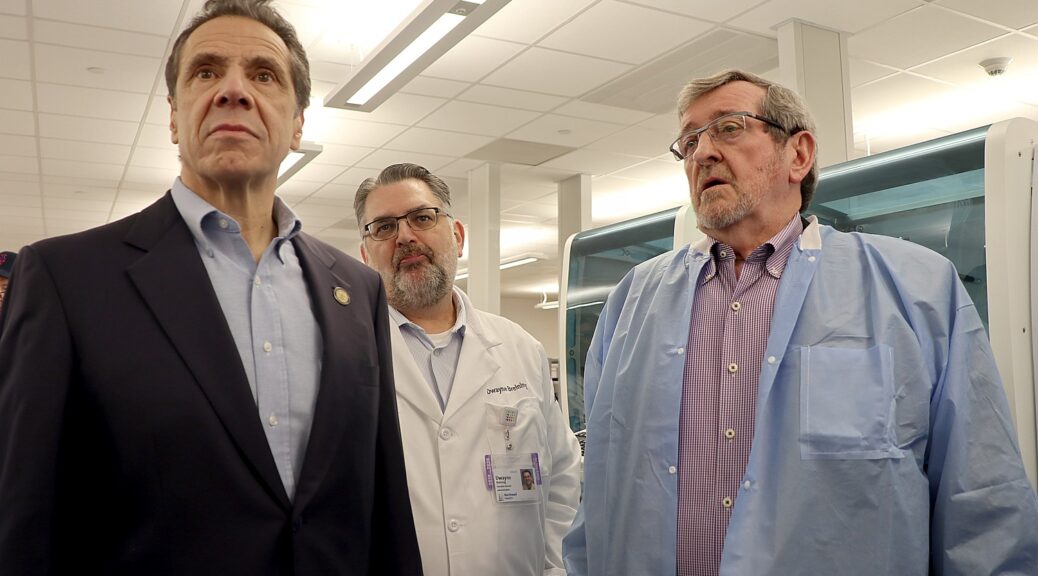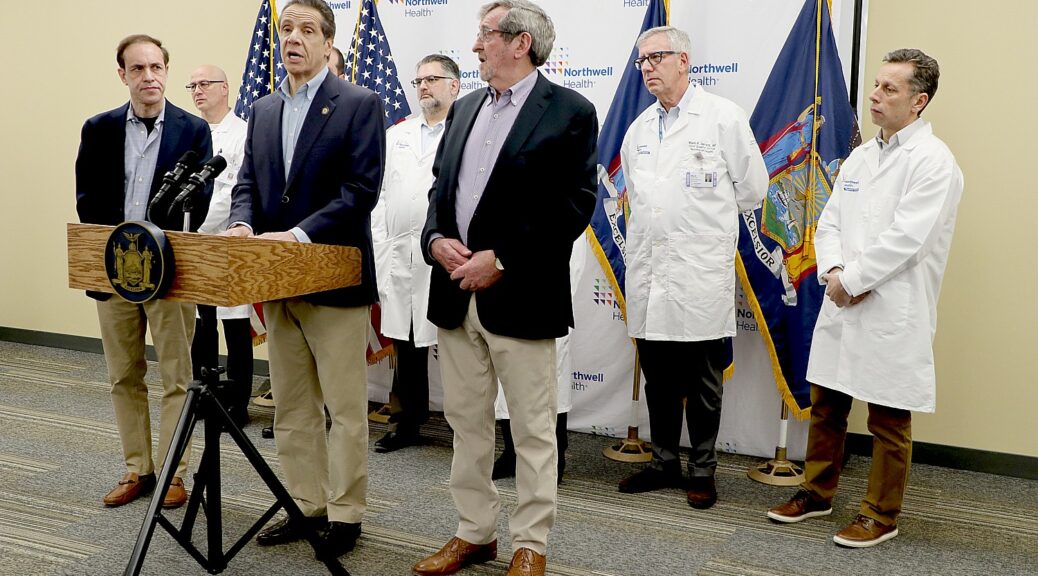
By Karen Rubin, News-Photos-Features.com
Governor Andrew M. Cuomo today announced the formation of a new hospital network Central Coordinating Team to facilitate a more coordinated and strategic approach among the state’s healthcare system in combating the COVID-19 pandemic.
The program could become a model for other states, indeed, a model for a national approach to providing necessary personnel and equipment to address coronavirus hotspots as they emerge around the country as Cuomo called for unity.
The coordinating team will help implement the statewide public-private hospital plan, which the Governor announced yesterday, to share information, supplies, staff and patients among hospitals across the State. The team will be responsible for organizing upstate to downstate staffing; assisting Elmhurst Hospital and other stressed hospitals; setting patient thresholds for hospitals; organizing patient transfers to other hospitals and the USNS Comfort; coordinating State-City stockpiles and individual hospital stockpiles; and facilitating staffing recruitment.
The team will be led by the State Department of Health and includes the Westchester, New York City and Long Island healthcare systems, the Greater New York Hospital Association and the Healthcare Association of New York State. The team will also work with FEMA and the federal government.
Governor Cuomo also announced the State is launching an online portal that will help connect hospitals and healthcare fasciitis across the state with the nearly 80,000 healthcare workers who have volunteered to work on a temporary basis during the COVID-19 pandemic. The portal will prioritize the deployment of workers to hospitals with the greatest need; volunteers are expected to be deployed as early as this Thursday.
“As we continue to battle the ongoing COVID-19 pandemic, we have two missions – preparing our hospital system so it is not overwhelmed when the apex of the curve hits and ensuring people stay home so they don’t get the virus in the first place,” Governor Cuomo said. “We are following the mathematical projections of the experts and preparing for the main battle at the apex by procuring as much equipment as we can, increasing our hospital capacity and supporting hospital staff. We met with the entire state hospital system for the first time ever and established an unprecedented new approach to work cooperatively as one unified, statewide healthcare system to defeat this virus. This virus does not discriminate — no one is immune to it — and people must continue to be cautious, think of others and not leave their homes unless absolutely necessary.”
The governor soberly gave “the blunt truth of this situation” saying: “Total number of people tested, 200,000. Population of 19 million, is not going to give you a random sample, but it’s been helping us track down on the positive cases. Number of positive cases, 9,298. Total cases 75,000 cases. You see the predominance in New York City, then Westchester, then Nassau, then Suffolk, then Rockland. So you can see it’s that area of density. It spreads out from that area of density. The march of coronavirus across the State of New York continues. We’re down to just two counties that don’t have a case. The overall numbers, 75,000 have tested positive. Ten thousand people in our hospitals, 2,700 ICU patients. Good news, 4,900 – almost 5,000 – discharged. That’s up 771. So people come in, they get treated, they go home.
“New York is at 75,000 cases. Next state is 16,000. California is at 7,000. So you can see New York, there’s a magnitude of difference more than any other state. Fifteen-hundred fifty deaths. That’s up from 1,218 yesterday. Again, we’re studying the charts. We’re trying to study the data, follow the data. The data is uneven. It bounces. Numbers often bounce in any model. There are variables in this model. The hospitals are reporting it, so what every hospital reported, were they busy, are they combining a couple of days in one? It’s an imperfect reporting mechanism.
“You see the basic line is still up. What the statisticians will tell you is you basically draw the straight line that columns indicate and you see that we’re still going up which is what we see on the overall trajectory, that we’re still going up. Number of intubations was down, not much, but it was down and that’s a good sign. You also see the number of discharges going up and that’s consistent. The longer people are in, they either get treated and leave or they get put on a ventilator and the longer you’re on a ventilator, the less likelihood you will come off the ventilator. That is the blunt truth of this situation.”
With the realization that New York is still 14 to 30 days from reaching the apex – that is, the peak of number of cases on a given day – after which there would still be the descent before the crisis is ended, Cuomo said, “In general, I am tired of being behind this virus. We’ve been behind this virus from day one. The virus was in China. We knew it was in China. Unless we assume there’s some immune system variation with Asian people, it was coming here and we have been behind it from day one since it got here and we’ve been playing catch-up. You don’t win playing catch-up. We have to get ahead of it. The second rule is never underestimate your opponent, and we underestimated this virus. It’s more powerful, it’s more dangerous than we expected, and the third point is plan forward. Get ahead of it. Get ahead of it, fight the fight today, yes, but anticipate the next battle and plan for the next battle.
“And the main battle is at the apex. We’re still going up the mountain. The main battle is on the top of the mountain. That’s where the main battle is going to be. The apex of the curve and then we come down the other side of the mountain. We are planning now for the battle at the top of the mountain. That’s what we are doing. Get a staffing plan ready now for the battle at the top of the mountain. Equipment stockpile now – we’re gathering equipment that we don’t need today because today is not the day of the battle. The battle is when we hit the apex, depending on who you believe, 14 days to 30 days from today.
“And also we need a social acceptance of the time expectation. We’re all anxious. We’re all tired, we’re all fatigued. It’s been all bad news for a long time. Our whole lifestyle has been disrupted. Everybody knows wants to know one thing, when is it over, nobody knows. Well, President said by Easter; this one said by this – nobody knows. You can have a hypothesis, you can have a projection, you can have an opinion but nobody knows, but I can say this, it is not going to be soon. If our apex is 14 to 21 days, that’s our apex. You then have to come down the other side of the mountain once you hit the apex, so calibrate yourself and your expectations so you’re not disappointed every morning you get up.”
Cuomo described the “balkanization” and “fragmentation” of the state’s health care system – private hospital chains, public hospitals, downstate and upstate, city and suburbs and rural communities, rich and needy and now federal hospitals – and said that he was creating a network where staff, supplies and patients would be allocated as needed.
“That has to be our mentality. We laid out a full plan on how to do facility development, how to move people among hospitals so nobody gets overloaded, shifting patients, shifting staff, shifting supplies. None of us have enough supplies. Okay, then let’s pool our supplies and let’s put them out for the people who need them. Just because one hospital happened to have found a vendor from China who delivered 5 million masks, let’s share those masks.”
Getting ahead of the virus means gearing up for the projected apex and stockpiling vital equipment like ventilators for the day when they will be needed – a remark intended to blunt Trump’s veiled accusation that Cuomo was warehousing 4,000 ventilators while complaining that he needed 30,000.
And he continued to appeal for mass testing as critical to not only determining who is sick, but who has the antibodies and therefore no longer at risk.
The crisis ends, he said, “when we get a fast track test, an at home test, 15-minute test, and people can find out when they can go back to work because they’re negative. We’re working on additional testing. As I said, the department of health has a new test, but that’s when this ends
“We’re also working on the new medications. We’re leading the country in many of these developments. We have saliva testing. We’re working on the antibody testing and plasma testing at the same time.”
Cuomo added, “We know what to do. We just have to do it. It is individual discipline to stay at home. That’s what it is, it’s discipline. No social distancing. It’s discipline. Well, I’m bored. I know. I’m bored. It’s discipline. Making this healthcare system work, that’s government skill, that’s government performance. That’s saying to that healthcare system, I don’t care how it worked yesterday, I don’t care whose turf this is, I don’t care whose ego is involved, I’m sorry, we have to find a way to work, a better way. Time to say to that federal government and to FEMA and HHS, you have to learn how to do your job, and you have to learn how to do it quickly. Because time is not our friend. It’s about a social stamina. This is not one week, two weeks, three weeks, four weeks, five weeks, six weeks, okay? This is not going to be an Easter surprise. Understand that and have the stamina to deal with it.
The coordination of the state’s health care system is but one step in what Cuomo called for as “unity” – coordination and cooperation among states.
“Let’s help one another. New York needs help now. Yesterday I asked for healthcare workers from across the country to come here because we need help. We will pay you, and more importantly, we will return the favor. This is going to be a rolling wave across the country. New York, then it’ll be Detroit, then it’ll be New Orleans, then it will be California. If we were smart as a nation, come help us in New York. Get the equipment. Get the training. Get the experience. And then let’s all go help the next place, and then the next place, and then the next place. That would be a smart national way of doing this. And showing that unity. And, unity meaning, we’re not, I know this is a political year, and everything is a political backdrop, and Democrats want to criticize Republicans, Republicans want to criticize Democrats. Not now. Not now. There are no red states, there are no blue states. The virus doesn’t attack and kill red Americans or blue Americans. It attacks all Americans. And keep that in mind, because there is, there is a unifying wisdom in that.”
The Governor confirmed 9,298 additional cases of novel coronavirus, bringing the statewide total to 75,795 confirmed cases in New York State – among them, the governor’s own brother, Chris Cuomo, who anchors a news program on CNN. Of the 75,795 total individuals who tested positive for the virus, the geographic breakdown is as follows:
| County | Total Positive | New Positive |
| Albany | 226 | 9 |
| Allegany | 7 | 0 |
| Broome | 38 | 3 |
| Cattaraugus | 6 | 0 |
| Cayuga | 3 | 0 |
| Chautauqua | 6 | 1 |
| Chemung | 20 | 5 |
| Chenango | 19 | 2 |
| Clinton | 21 | 4 |
| Columbia | 30 | 4 |
| Cortland | 8 | 0 |
| Delaware | 16 | 5 |
| Dutchess | 484 | 92 |
| Erie | 438 | 62 |
| Essex | 4 | 0 |
| Franklin | 9 | 3 |
| Fulton | 1 | 0 |
| Genesee | 10 | 1 |
| Greene | 16 | 6 |
| Hamilton | 2 | 0 |
| Herkimer | 12 | 0 |
| Jefferson | 12 | 1 |
| Lewis | 2 | 0 |
| Livingston | 13 | 1 |
| Madison | 41 | 7 |
| Monroe | 292 | 50 |
| Montgomery | 7 | 1 |
| Nassau | 8,544 | 1,200 |
| Niagara | 42 | 1 |
| NYC | 43,139 | 5,686 |
| Oneida | 40 | 6 |
| Onondaga | 194 | 14 |
| Ontario | 22 | 2 |
| Orange | 1,556 | 121 |
| Orleans | 6 | 2 |
| Oswego | 15 | 1 |
| Otsego | 18 | 1 |
| Putnam | 186 | 19 |
| Rensselaer | 41 | 1 |
| Rockland | 2,863 | 352 |
| Saratoga | 108 | 3 |
| Schenectady | 85 | 5 |
| Schoharie | 6 | 0 |
| Schuyler | 2 | 0 |
| Seneca | 2 | 2 |
| St. Lawrence | 30 | 17 |
| Steuben | 24 | 5 |
| Suffolk | 6,713 | 922 |
| Sullivan | 109 | 8 |
| Tioga | 7 | 3 |
| Tompkins | 66 | 0 |
| Ulster | 211 | 21 |
| Warren | 18 | 0 |
| Washington | 10 | 3 |
| Wayne | 19 | 4 |
| Westchester | 9,967 | 641 |
| Wyoming | 9 | 1 |

